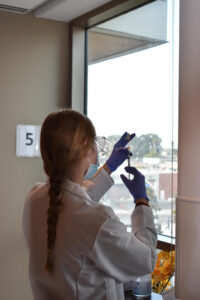
File photo
Whether trying to lose weight or avoid the flu, all month long CVW will share insights from the pros.
By Mary O’KEEFE
During the month of January, CVW focuses on mental and physical health. Many people look at the beginning of the new year as the kick-off of that diet they had been planning to start or with every intention of exercising every single day. For some, maintaining those goals continues throughout the year; however, many people start out strong but then, as life takes over, those goals disappear as focus wanes. CVW will be looking at some of the most popular diets, talk to experts on how to stay goal-oriented and how mental health plays a role in a person’s physical health.
We will also be looking at what viruses are making the rounds and how early detection of a variety of illnesses can make a big difference in health care.
We begin with our kids. Whether you are a parent, grandparent, aunt, uncle or just a family friend who has young ones there has probably been a time when you go to hug that perfect little munchkin … and they sneeze in your face. Germs spread at an alarming rate.
A sneeze can expel tens of thousands of droplets from the nose at up to 100 miles per hour, according to the American Lung Association. And a cough can travel as fast as 50 mph and expel almost 3,000 droplets in just one go.
“There is a bit of everything going around currently,” said Dr. John Rodarte, pediatrician in La Cañada Flintridge.
He added there is some COVID, but also RSV (respiratory syncytial virus) that can give anyone a prolonged cough; however, the youngest and oldest are hit more severely.
There is also influenza making the rounds, mostly type A, that bring high fevers that last up to a week, body aches, headaches and sore throat, he said.
“There’s been some Strep off and on, more commonly in the older school-aged kids, and adults. We’ve seen a stomach virus with vomiting and diarrhea, and just a regular old cold virus (commonly a rhinovirus),” Rodarte said.
How can parents and kids avoid getting sick this season? That is not a question with an easy answer.
“Sometimes it’s unavoidable to catch something in the household or at school/work. But if you have a fever you should definitely stay home. If the cough is not too severe, you can consider going back to school but you may want to wear a mask to reduce spreading to others,” he said. “Of course, the tried and true washing hands, eating right and getting enough sleep helps the body stay strong to fight off getting sick.”
And he reminds everyone that it is not too late to get a flu shot for the season.
“Fall and winter are times when viruses that cause respiratory disease usually circulate more heavily in the community. Before COVID-19, two viruses – flu and RSV – were the main causes of severe respiratory disease during this time of year. Although some people have mild symptoms when they catch flu or RSV, others get sick enough to be hospitalized. Some seasons are more severe than others based on strains of the viruses circulating and our immunity to these viruses. One measure of the severity of a season is how many people are sick enough to be hospitalized, because this can stress the health care system,” according to the Centers for Disease Control and Prevention (CDC).
In December 2023, the CDC announced it is tracking JN.1, one of the many variants of SARS-CoV-2, the virus that causes COVID-19. As of Dec. 23, 2023, JN.1 was projected to account for about 39% to 50% of circulating variants in the U.S. However JN.1 did not appear to pose additional risks to public health beyond that of other recent variants.
